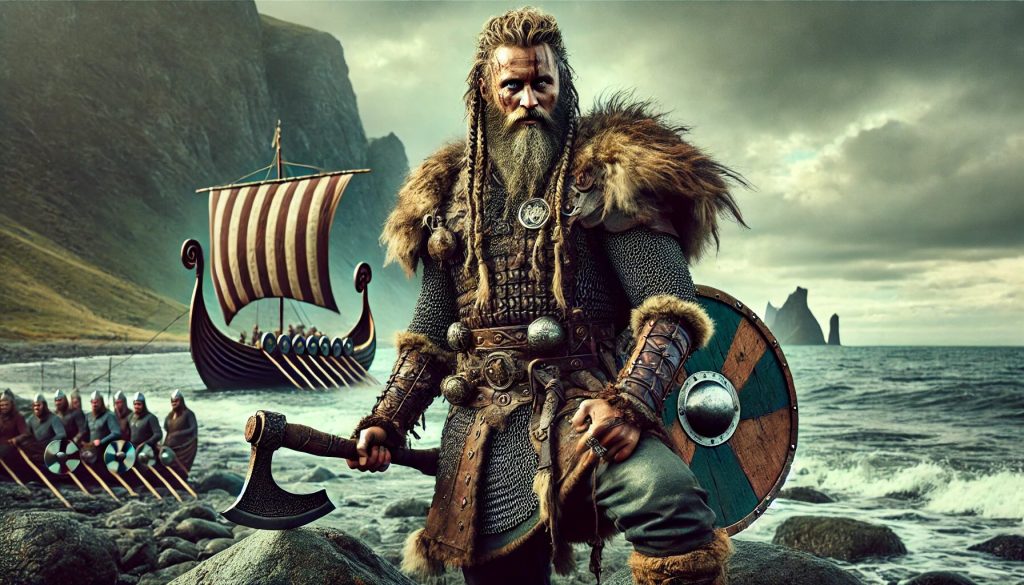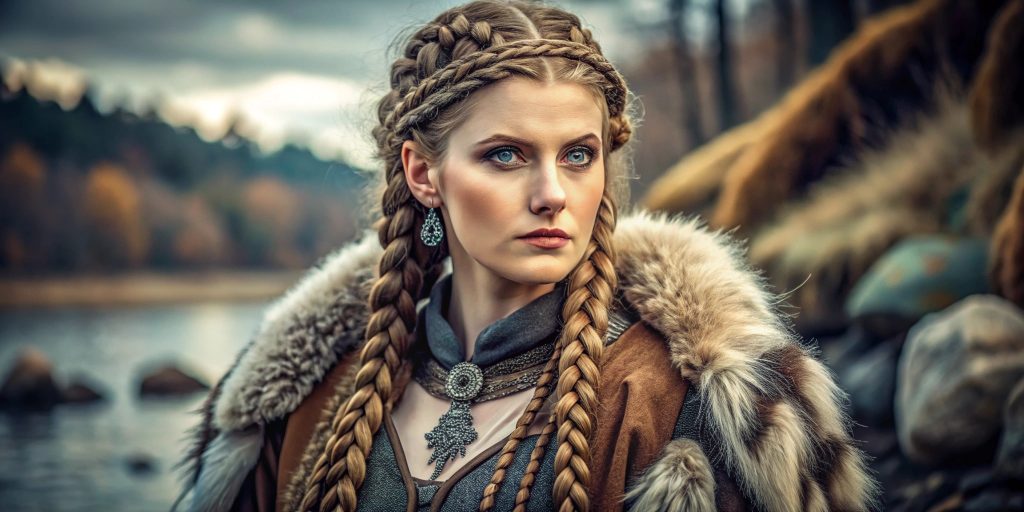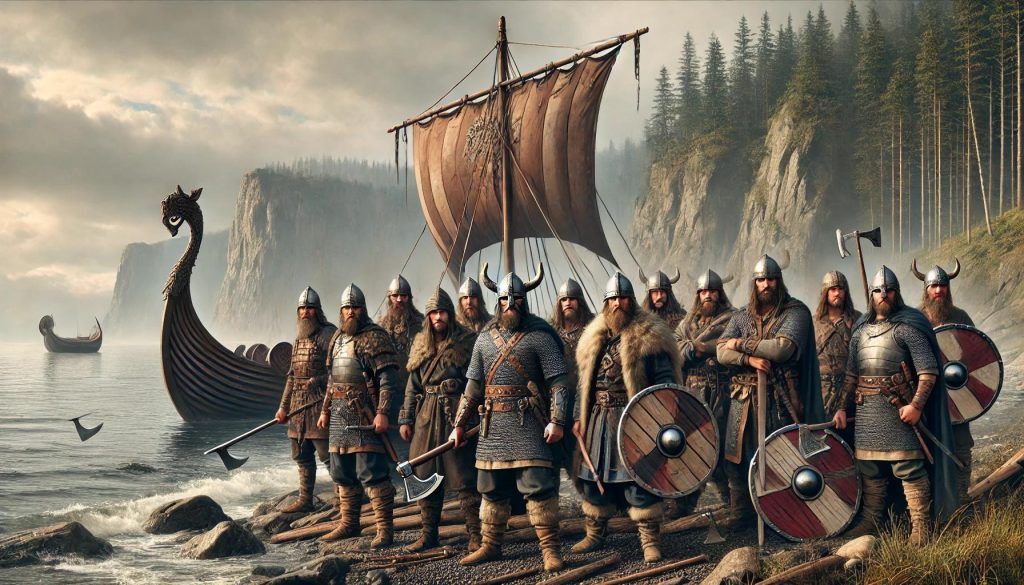Daily Life in the Viking Age, Viking Heritage, Vikings
From Warriors to Families: The Story Behind Viking Last Names
Viking last names tell a story of warriors and families. They started in the Viking Age, showing the fierce identity of the time. They show how society has changed and how we see our heritage today.
These names reflect culture, lineage, and social roles. They are vital in understanding history and family connections, particularly through last names and meanings derived from the father’s name. As we look into Viking history, we see how these powerful Viking last names changed from warrior marks to family names.
Introduction to Viking Last Names
Viking last names are key in history and today. They tell stories of culture and family and reveal a lot about ancestry in Scandinavian countries.
Many Viking names come from the Old Norse. They show a strong link to the past. Names often tell us about a person’s life, like their job or traits.
In Norway, names often relate to places or events, reflecting their Old Norse origin. This shows the deep history behind them.
Over time, Viking names changed but kept their essence, often derived from the Old Norse language. Now, they help people learn about their family history. They connect us to our Viking roots.
The Historical Context of Viking Surnames
The Viking Age (793-1066 AD) was a great change. It shaped how people were named in society, particularly through names derived from the Norse. The feudal system and culture of the time played big roles in this.
Vikings traveled far and wide, taking their culture with them, including the old Norse names they carried. This led to different names in Scandinavia. Each place had its name, shaped by local traditions and languages.
Viking journeys and settlements changed names in Norway, Sweden, and Denmark. Names often came from the father’s name. For example, a son might be Eriksson, and a daughter, Eriksdottir, both derived from the given name Erik. This showed family ties were important.
As time went on, more diversity in names appeared. Vikings moved around mixed cultures, which created names that meant a lot to the communities they joined.
Norse Origins of Viking Last Names
Viking last names come from the Norse language and culture. They tell us about the Viking people’s identity and history. Old Norse shows how these names were made and changed over time.
This shows the big impact of old Norse on Scandinavian languages today.
Understanding Old Norse Influences
Many Viking last names come from the Old Norse. They have elements that show their meanings. Names often show personal traits, family ties, or jobs.
Knowing these meanings helps us understand the cultural depth of Viking names, especially those derived from Old Norse. Experts say understanding the original meanings is key.
Challenges of Translating Viking Names
Translating Viking names is tricky. Old Norse has many dialects, making it hard for historians and linguists. Many names have changed a lot over the years.
This can cause confusion and the wrong meaning. Knowing the language’s subtleties is important to truly understand Viking names.
Patronymic Surnames: The Viking Naming System
The Vikings used a special naming system based on the father’s name, called patronymic surnames. For example, a son named Eriksson means “son of Erik.” This made it easy to know who was related to whom.
The Vikings used “-sson” for sons and “-dóttir” for daughters. This showed the difference between boys and girls, as seen in names like Haraldsson for boys and their female counterparts. It helped keep family ties strong in Norse society.
Even though the Vikings mostly used this system, there were some changes. In some places, names were different. This showed how local customs and influences affected names. Over time, some names became permanent, even if they started as temporary names.
The patronymic surname system is key to understanding Viking culture. It connects families across generations and keeps the Viking heritage alive today.
Common Viking Last Names and Their Meanings
Viking last names connect us to our heritage. They show the rich history and culture of the Norse people, including strong Viking last names. Common Viking last names often reflect family, jobs, and community values. Here are some popular Viking surnames and what they mean.
Examples of Popular Viking Last Names
- Hansson: This surname means “son of Hans,” showing the Viking naming tradition.
- Olsen: It means “son of Ole,” showing Viking use of ancestral ties in names.
- Eriksson: This name means “son of Erik,” honoring Erik the Red, a famous Viking leader.
- Magnusson: It translates to “son of Magnus,” honoring notable figures named Magnus.
Significant Meanings Behind Common Names
The meanings of names in Viking culture often show traits or places. For example, “Hansson” might mean strength and resilience, important for survival. “Olsen” might suggest a connection to great leaders or important events, showing how these last names with meanings last through generations.
These examples show that famous Viking last names are more than just names; they often hail from their rich Old Norse heritage. They represent the values and social structures of Norse society. Each name tells a story of the past and the people who shaped it with their significant Viking names.
Famous Viking Last Names Through History
Famous Viking last names come from legendary heroes. Their stories are part of Norse mythology and the Viking Age. These names show their achievements and the culture of those times.

Legendary Viking Heroes and Their Surnames
Ragnar Lothbrok and Bjorn Ironside are well-known in Norse history. They led raids and expanded territories. In Norse culture, their names mean strength and valor.
Ragnar’s surname, Lothbrok, means “shaggy breeches, ” which is tied to his many adventures. Bjorn Ironside’s name suggests iron and resilience, showing his fierce Viking spirit.
Influential Figures in Norse Culture
Other figures also shaped Norse culture. Kings and warriors like Harald Hardrada showed Viking strength and ambition. Harald’s name is linked to big military wins.
His surname means leadership and bravery. Each name of these important people shows their impact. It has shaped Norse society for many years.
Cool Viking Last Names
Viking last names show strength and bravery. They capture the spirit of warriors and explorers, much like the legendary Sigurd. Names like “Stonefist” and “Fireblade” symbolize Viking bravery and power.
Unique Viking Names That Stand Out
Names like “Odinsson” and “Valgard” show the importance of lineage and valor, often derived from the father’s name. These names tell stories and uphold Viking ideals. They fascinate people today, showing the power of Viking heritage.
Strength and Power in Viking Naming
In Viking culture, names showed strength and power. They reflected personal traits and notable qualities. Badass Viking last names, such as those derived from the Old Norse, highlight the importance of legacy and identity.
Female Viking Last Names and Their Significance
Female Viking last names give us a peek into women’s lives back then. These names often came from their fathers or mothers. They show how family ties were strong in a society led by men.
Women in Norse society did a lot, like running homes and trading, often influencing the given names of their descendants. They even fought in battles. Their names tell us about their family and community ties. They show women’s strength and roles, even in a society that limited them.

- Names like Freydis, from myths, show strong female characters.
- Many women chose names that showed their family loyalty.
- Unique surnames came from special actions or traits, showing their reputation and often derived from Old Norse.
Looking into these names, we see women’s importance beyond just names. They show women’s strength, resilience, and key roles in their communities. This highlights women’s lasting impact on Viking culture.
Last Names Derived from Occupations in Viking Culture
Occupational last names give us a peek into Viking life. They show the different jobs Vikings had. By looking at these names, we learn about the skills that were key in Viking culture.
Reflecting on the Roles of Vikings in Society
Vikings had many jobs that kept their communities going. They were craftsmen, traders, and more. Each job was important for society’s structure, and the names of these jobs show how vital they were.
These names tell us about teamwork and skills in Viking society. They show a community built on collaboration and skill.
Examples of Occupational Last Names
Many last names come from Viking jobs. Here are some examples of Norse surnames:
- Baker – shows who made food.
- Fisher – for those who caught fish.
- Smith – for blacksmiths who made tools and weapons.
- Hunter – for those who hunted for food.
- Carpenter – for woodworkers.
These names show the variety of Viking jobs. They help us understand Viking life better. Knowing about these jobs helps us see how Vikings lived and worked together, particularly in their common last names.
Scandinavian Influence on Viking Last Names
The Vikings left a big mark on Scandinavia’s culture. Their last names still show their influence today. In Sweden, Norway, and Denmark, names keep ties to their Viking past, often derived from Old Norse.
Viking names often came from the father’s first name, which is still seen in many Scandinavian names today. This shows family ties and heritage, linking generations together.
Even now, Viking names are part of Nordic naming traditions. Names like “-sen” or “-dottir” mean “son of” or “daughter of.” These parts add meaning, linking names to Viking history.
- Examples of enduring surnames include:
- Andersen
- Johansson
- Magnusson
This shows a strong link between Vikings and today’s Scandinavians. It’s amazing to see how old traditions live on in names. Scandinavian names tell stories of the past and present.
Viking Last Names in Modern Context
Viking last names hold deep historical and cultural value today. They show a proud heritage that many modern people cherish. This heritage is still important, especially in Scandinavian countries.
It has led to a growing interest in Norse culture. People worldwide are curious about their Viking roots and legacy.
Continued Relevance of Viking Heritage
Being connected to Viking ancestry gives modern people a sense of identity. Families keep their Viking names alive. This way, they remember their ancestors’ stories.
This shows how Viking heritage remains relevant. It’s about cultural pride and valuing history.
Exploring Modern Descendants of Vikings
Many people today proudly carry Viking last names. These names connect them to their Viking past. They show the lasting impact of Viking culture.
Viking influence is seen in many areas of life, including festivals, naming traditions, art, and literature. This shows the strong bond to Viking history.
Final Thoughts
Viking last names have a rich history. They connect us to our Viking roots, and knowing their origins helps us understand Viking values and society.
Today, these names still hold importance. They give us a peek into a lively past. They symbolize bravery, skill, and a strong spirit.
Viking names are more than old relics. They link us to our noble past. Exploring their meanings shows how Viking culture still shapes us today. This connection helps us value our shared history and respect our ancestors.

